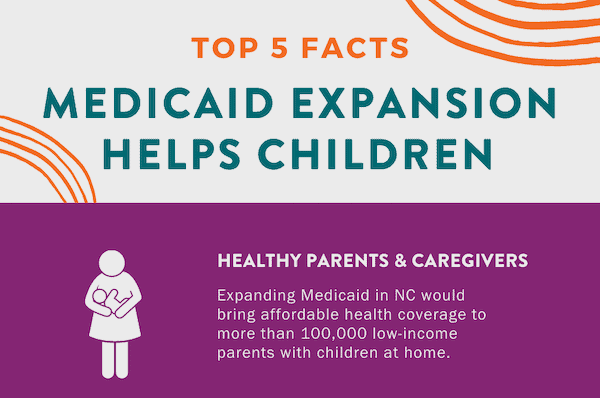North Carolina’s leaders have a huge opportunity to bring affordable health coverage to hard-working, low-income people in our state, building back stronger from COVID-19. Lack of health insurance has become a dire issue for many more families during the COVID-19 pandemic. The latest federal COVID-19 relief bill provides our state with significant financial incentives to expand Medicaid coverage to low-income families who have no other health insurance option. It would provide even more funds for the state’s existing Medicaid program, which mostly covers children and disabled adults.
Infographic: How Medicaid Expansion Helps Children (click to view):
Expanding Medicaid can help working families pull through incredibly difficult times.
The economic impacts of the pandemic have hit low-wage working North Carolinians hardest of all. Expanding Medicaid right now will make sure that people who lost hours or jobs can still get affordable health coverage to get healthy, stay healthy, and be ready to work again as we reopen.
Parents can’t work and take care of their children when they’re not healthy. Many North Carolina parents don’t earn enough to buy private health insurance, but do not qualify for Medicaid. A family with two parents and two children that earns as little as $1,000/month makes too much for Medicaid. Expanding Medicaid would bring affordable health coverage to at least 100,000 low-income parents with children at home.
Contact your state legislators today to let them know how important this issue is to you, and to North Carolina’s recovery.
Covering Parents & Caregivers Means More Kids are Covered, Too
A growing number of children in our state have no health insurance. An estimated 142,000 North Carolina children were uninsured in 2019 (most recent data year available), a number that has increased about 23% since 2016, according to recent research. North Carolina is now one of the bottom ten states in terms of covering children.
This worrisome downward trend comes after decades of successfully reducing the child uninsured rate in North Carolina. Without health coverage, children cannot access the care they need to grow ,thrive, and learn. They often miss developmental screenings, critical childhood vaccinations, and forego needed care. Research shows children with health coverage are more likely to graduate from high school, attend college and grow up to be healthier and more productive adults. Put simply, ensuing meaningful access to comprehensive health care for children and families is a critical investment to the long-term wellbeing of our state for generations to come.
When parents and caregivers have health insurance, children are more likely to be covered as well. New research has found that states that expanded Medicaid have significantly lower rates of uninsured children.
“While Medicaid expansion was designed to help uninsured adults who could not afford private insurance, the policy change also benefits children. When parents gain coverage, they are more likely to access the supports they need to be a healthy and effective parent, more likely to enroll their children in “whole family” health coverage, and more likely to take their children to the doctor.” Source: Georgetown Center for Children & Families
Every parent and caregiver needs reliable, affordable access to health care. Income should not be the factor that determines whether parents & caregivers can get the care they need – including foster and adoptive parents, grandparent caregivers, and anyone with children depending on them.
Our 2019 issue brief, Early Educators in the Health Care Coverage Gap, explored the high rate of uninsurance among child care providers in our state. 1 in 5 early childhood educators in North Carolina has no health coverage.
Do you know what it’s like to live without health coverage? Your perspective is powerful. If you’re willing to talk to the NC Child team about your experiences, please let us know. An NC Child team member will follow up with you right away.
Addressing Racial & Ethnic Disparities
Black and Latinx families are less likely to have health insurance than other groups in our state – a factor that contributes to disparities in health outcomes as well. In North Carolina, Black people are 30% more likely than whites to be uninsured, and American Indian people are 60% more likely to be uninsured. Hispanic/Latinx people are 3 times more likely than whites to be uninsured (source: Kaiser Family Foundation).
If North Carolina were to expand Medicaid, half of those newly insured would be people of color. Expanding Medicaid in North Carolina can help address long-standing health disparities for people of color in our state, including infant mortality. The COVID-19 pandemic has been especially brutal for families of color, who are over-represented among those affected by COVID-19, especially among Hispanic/Latinx families. Latinx people make up just 10% of North Carolina’s population, but 21% of the state’s COVID-19 cases.
We can tackle these racial and ethnic disparities head-on, setting up more children for life-long health and well-being, by making health coverage affordable for all families.
Effect on Health Care Costs
Not having coverage often keeps people from getting the preventive care they need. Covering more uninsured people reduces health care costs for everyone, even for those who have their own private health insurance. When people can’t afford basic care, they often wind up in the ER with preventable – and very expensive – health crises. Hospitals have to eat the cost – and those costs are passed along to the rest of us. That’s why premiums for people who buy their own health insurance are now significantly lower in the states that have expanded Medicaid.
Benefits for Rural North Carolina
Rural hospitals are critical for our local communities, but they have been closing across our state in recent years. A hospital closure means longer drives and longer waits for health care – as well as lost jobs – in that community.
The financial strain on rural hospitals is due in part to providing unpaid emergency services to people without insurance. Getting affordable health coverage to those who really need it could help these hospitals, and our rural communities, build back stronger. Read more in NC Child’s 2020 issue brief: North Carolina’s Rural Health Systems in Crisis.
Expanding Medicaid would provide sustainable funding that our health care providers desperately need. Our hospitals and health care systems have been financially stretched to the brink by COVID-19. They should not have to continue to provide unpaid care for the uninsured – and now there is a solution available.
For so many reasons, the NC General Assembly should act now to bring these funds to North Carolina.
Do you know what it’s like to live without health coverage? Your perspective is powerful. If you’re willing to talk to the NC Child team about your experiences, please let us know. An NC Child team member will follow up with you right away.
Contact your state legislators today to let them know how important this issue is to you, and to North Carolina’s recovery.




